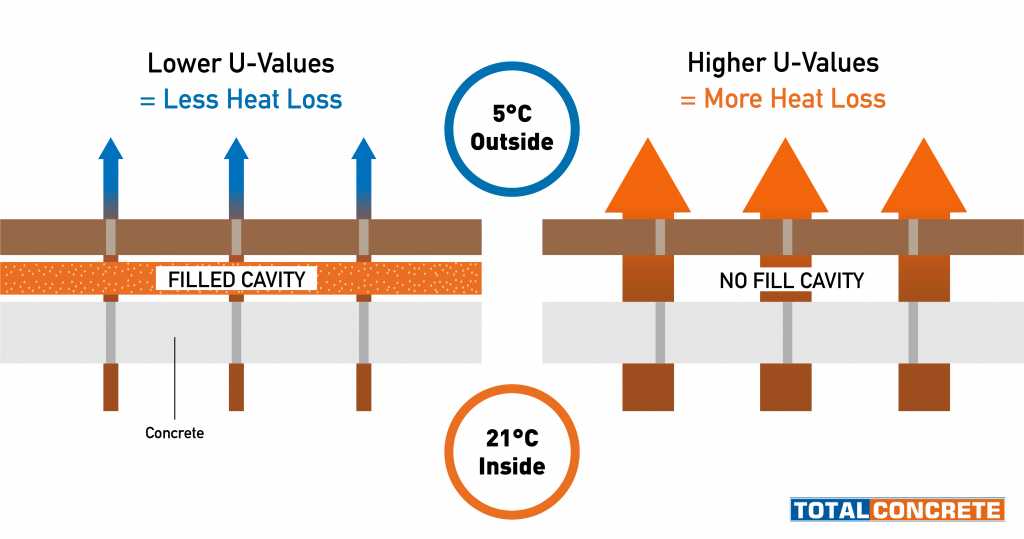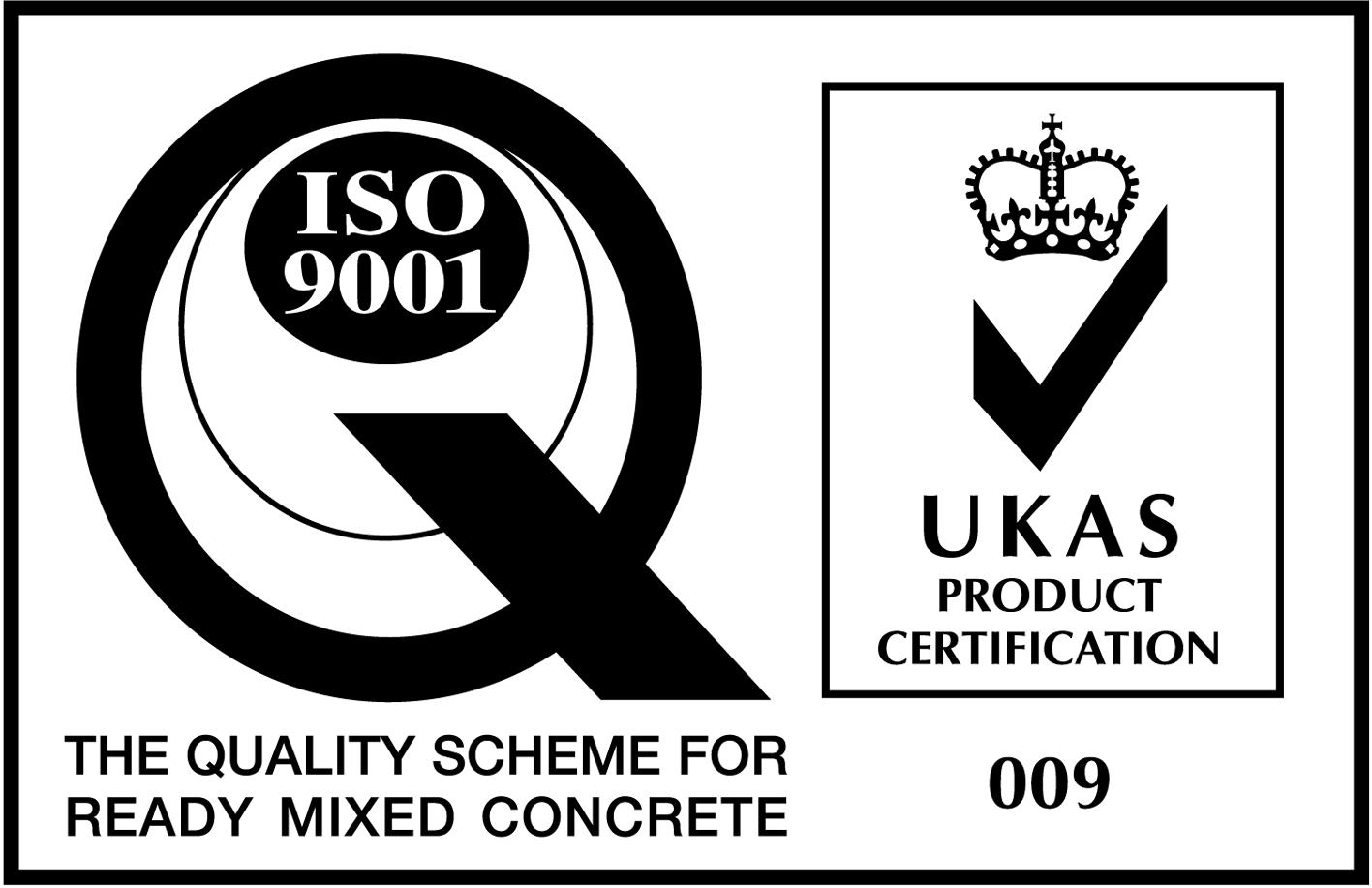What is the R-Value for Concrete?
It’s possible to calculate the thermal resistance of your walls or floor to determine just how insulative they really are. This is called the R-value, and it is obtained as a result of a calculation that we will cover in this article.
In addition to the R-value, there is the U-value, which is the inverse, or the thermal transmittance of a structure. Understanding R-values and U-values is important when deciding which materials to use for your project.
If you need concrete, place your order with our team on 0800 859 5371 or use our concrete calculator.
In this article, we’ll be taking a look at the R-value of concrete, including how to measure it and ways to improve it.
What is R-value and U-value?
Put simply, the R-value is the insulating capability of a given material. The higher the R-value, the more resistant it is to the transfer of heat from one side to the other.
Conversely, the U-value is the thermal transmittance capability of a given material. The higher the U-value, the easier it is for heat to transfer from one side of a structure to the other. Put another way, the higher the U-value, the poorer the insulation.
Thermal insulation increases and density decreases, meaning that concrete with a lower density has a greater R-value than concrete of a higher density. Typically, the type of concrete used for floor slabs has an R-value of 0.1-0.2 per inch of thickness.
Looking for high-quality concrete for your projects? Get in touch today
ContactHow do you calculate R-value?
The equation for calculating R-value can be condensed to R = t/?, where ‘t’ is the thickness of the material in metres and ? is its thermal conductivity (sometimes written as the k-value).
The lambda (?) value indicates the quantity of heat (W), that is conducted through a wall of 1m2, in a thickness of 1m, when there is a temperature difference between the opposite surfaces of 1K (1ºC). To get really technical, you can express ? as W/(mK).

Check out some R materials for common building materials below:
| Material | Thickness | R-value (F° · SQ.FT.) |
| Air Films | ||
| Exterior | 0.17 | |
| Interior Wall | 0.68 | |
| Interior Ceiling | 0.61 | |
| Building Board | ||
| Gypsum Wall Board | 1/2″ | 0.45 |
| Gypsum Wall Board | 5/8″ | 0.5625 |
| Plywood | 1/2″ | 0.62 |
| Plywood | 1″ | 1.25 |
| Fiberboard Sheathing | 1/2″ | 1.32 |
| Medium Density Particle Board | 1/2″ | 0.53 |
| Masonry and Concrete | ||
| Common Brick | 4″ | 0.80 |
| Face Brick | 4″ | 0.44 |
| Concrete Masonry Unit (CMU) | 8″ | 1.11 |
| Concrete Masonry Unit (CMU) | 12″ | 1.28 |
| Concrete 60 pounds per cubic foot | 1″ | 0.52 |
| Concrete 70 pounds per cubic foot | 1″ | 0.42 |
| Concrete 80 pounds per cubic foot | 1″ | 0.33 |
| Concrete 90 pounds per cubic foot | 1″ | 0.26 |
| Concrete 100 pounds per cubic foot | 1″ | 0.21 |
| Concrete 120 pounds per cubic foot | 1″ | 0.13 |
| Concrete 150 pounds per cubic foot | 1″ | 0.07 |
| Granite | 1″ | 0.05 |
| Sandstone / Limestone | 1″ | 0.08 |
| Flooring | ||
| Hardwood | 3/4″ | 0.68 |
| Tile | 0.05 | |
| Carpet with fibre pad | 2.08 | |
| Carpet with rubber pad | 1.23 |
How to prevent heat loss in your home
If the R-value of your floor or walls is not very high, you may need to resort to alternative methods to reduce heat loss.
One method is to insulate the interior of your wall by installing rigid foam board insulation. These lightweight panels are available in 3×4 or 4×8 sizes and are easily held in place with foam-safe glue. The panels can be cut to the correct size using a standard table saw or utility knife.
Alternatively, a more expensive option is to reface the outside of the wall with an EIFS (Exterior Insulation and Finish System). This will cover the wall with a dense material up to four inches thick.
To insulate a concrete floor, you should focus on the edges of the slab that are in contact with the air at the exterior of the building. You should aim to isolate the concrete floor from the perimeter foundation or simply cover the outside of the foundation wall. Before pouring the concrete floor, it is recommended to lay a vapour barrier beneath what will become the slab and apply rigid foam insulation around the edges.
Total Concrete is committed to bringing you high-quality concrete mixed to your precise requirements. Whether you need concrete for a wall or floor, for domestic or commercial purposes, we can help. Choose between various speciality mixes to find the best concrete for your needs.
If you’re interested in discussing our various concrete mixes, simply get in touch with our team. We’re happy to answer any questions you might have.
We serve customers in Woking, Guildford, Surrey and the surrounding areas. Contact our team today to place your order.
 Trade Zone
Trade Zone
